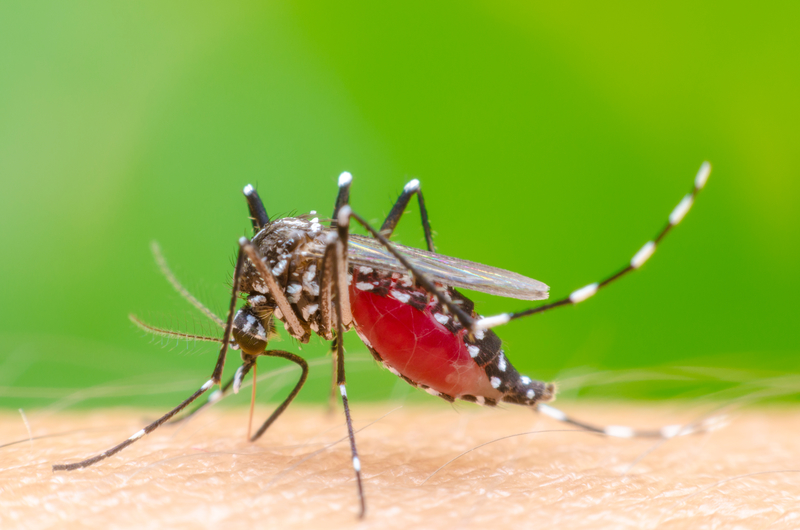I Tried 4 Natural Mosquito Repellents. This is what worked…

In my house, we joke about how much bugs love me. My husband claims he doesn’t need “bug dope.” He just brings me along to picnics and outdoor parties, sticks close by, and the mosquitos flock to me, leaving him blissfully alone and unbitten. I joke that I have a big neon flashing sign overhead that says, “All-you-can-eat buffet” that’s visible only to insects. If there’s a mosquito, biting fly, or any hungry insect around, I’m the most likely target, and you may see me running through the woods, arms flailing, trying (usually unsuccessfully) to keep the little buggers off of me. Combine that big ol’ insect target on my back with the fact that most chemical bug repellents are questionable when it comes to safety and toxicity, and it’s no surprise that I’m keenly interested in finding an effective natural mosquito repellent.
Mosquito Bites: What’s at Stake?
Most of us are well aware of the annoyance of bug bites. We’re familiar with the generally minor irritation, redness, itchiness, and discomfort common bug bites can cause. But there’s more at stake.
Different regions of the world are affected by different mosquito-borne diseases. Here in the U.S., we don’t have to worry much about malaria, yellow fever, dengue, and types of encephalitis that folks in many other countries do. However, we are seeing rising cases of West Nile virus, chikungunya, Zika virus, and some types of encephalitis. Worldwide, disease-carrying mosquitos transmit diseases to nearly 700 MILLION people each year. In fact, according to a 2018 report, mosquitoes are the deadliest creatures in the world, causing 750,000 deaths annually. (Malaria alone caused 445,000 deaths in 2016.) For comparison, sharks are responsible for a total of 6 deaths each year.
In 2016, 2,100 cases of West Nile were reported in the U.S., leading to 106 deaths. There were also 1,517 cases of malaria and 248 cases of chikungunya virus in America, and we’re now seeing cases of Zika popping up in Florida and Texas. So, protecting yourself from insect bites is no laughing matter. An effective natural mosquito repellent could save you from a serious illness or even death.
Why Mosquitos Bite
To be fair, male mosquitoes don’t bite humans (or any other animals). They feed off flower nectar just like butterflies and bees. Only female mosquitoes suck our blood. After the female mosquito probes around to find a blood-filled capillary with a hypodermic needle-like appendage called a proboscis, the sucked blood pumps into the abdomen, where it’s digested and used to produce eggs. Interestingly, when they “bite” us, mosquitoes also “inject” their own saliva into the bloodstream to stop it from clotting, making it easier to suck more blood. This is how disease-carrying mosquitos can transmit diseases. It’s also this substance that triggers the body’s immune response, which is quite a bit stronger in some folks compared to others.
If you’re one of the folks who seems to get bitten more than others, it is not your imagination. Surprisingly, 85% of your susceptibility to bites may be genetic, according to research from the London School of Hygiene and Tropical Medicine. For example, those people who produce greater amounts of certain compounds, including lactic acid, are more attractive to mosquitos. And those with the O blood type are also more susceptible.
Yet people who have naturally higher levels of other chemical compounds, like 1-methylpiperazine for instance, can appear nearly invisible to mosquitos. Studies have been done where people with these naturally produced compounds put their hands into a cage full of female mosquitoes, and the mosquitoes just sit back on the wall, not even noticing the hand. Lucky!
There are other factors too. Both movement and heat can attract mosquitos, so those who are exercising are more likely to get bitten. Yes, the increase of sweat, heat, lactic acid, and movement make you more likely to provide a mama mosquito with a blood meal. In addition, folks with higher concentrations of steroids or cholesterol, especially on the surface of the skin, those who give off more carbon dioxide, such as folks who are overweight as well as pregnant women, those with excess uric acid, and those who enjoy beer, wine, and cocktails appear to be more attractive to mosquitos as well.

Putting Natural Mosquito Repellents to the Test
In my quest to find the most effective natural mosquito repellent, I put several to the test by heading to an area with a healthy population of pregnant female mosquitos looking for a desired blood meal. (Admittedly, I was really not looking forward to this.)
Test #1: Control (i.e., no insect repellent)
I started the first day by sitting outside enjoying a glass of wine in my lovely garden for 30 minutes at dusk after a workout with absolutely no insect repellent. In other words, I was asking to get bit…
How Effective Was It?
Not surprisingly, it wasn’t effective at all. During the 30 minutes, I watched five mosquitos land on me and ended up with three bites. One I caught in the act; the others snuck up on me and left me with the tell-tale itchy signs of their success. I clearly need some help.
Test #2: Insect Repellent Bracelets
If you do an internet search, you’ll find a wide variety of natural mosquito repellent bracelets with a wide variety of different colors and styles. I searched for ones that had a high user rating and hit the buy button for the Original Kinven Mosquito Insect Repellent Bracelet. They come with four interwoven leather-looking bracelets per order, and they’re actually kind of cute. I even got a few compliments when I wore them.
Because they tie on, they can be adjusted to fit just about any size wrist. And perhaps best of all, there’s no spray, so you don’t have to worry about inhaling a nasty-smelling, potentially toxic aerosol. Plus, these actually smell, well, nice. They’re advertised to last for 15 days, but I just used them for one afternoon/evening, so I don’t know how long-lasting their effectiveness really is.
How Effective Was It?
I have to admit when I ordered these, I had low expectations. I didn’t think there was any chance they would work. Because I tested the insect repellents over several days, I started each test with a control period with no natural mosquito repellent (just in case there were no bugs out at all—one can always hope). I sat down outside with no insect repellent on until I started getting buzzed.
Then I took out the bracelet, put it on, and waited while keeping a close watch for any landings. I continued to wait as they flew by without noticing me at all. I was really surprised as the insects were leaving me completely alone. Even more surprising is that the people I was with had sprayed with a traditional DEET-containing insect repellent, and they were getting bit by mosquitos and biting flies (ouch!). In addition, I was the only one who had gone on a hike, and I was drinking a beer, which should have made me more attractive to the mosquitos.
In disbelief, thinking it must be a fluke, I took off the bracelet and gave it to one of the people who was getting bit. After she put it on, the bugs left her alone. And now that I no longer had on the bracelet, it wasn’t long before they started noticing me—landing on my arms and legs, searching for a capillary. I didn’t wait to get bit. I quickly pulled out a second bracelet from the pack and put it on. Again, no bites or even landings. Best of all, I was the only one who didn’t have any run-ins with deer flies throughout the afternoon and evening.
After I’ve gone through this pack of four, I will be getting more of these natural mosquito repellent bands, especially for hikes to give them a longer trial!
Test #3: Natural Mosquito Repellent Patch
These natural mosquito repellent patches are DEET-free, chemical-free, and non-toxic. And they can be stuck on just about any surface, like your clothing, backpack, tables, or chairs. They claim to use “advanced microencapsulation technology” that’s filled with citronella, peppermint, lavender, and eucalyptus oils. They have a variety of different colors and designs (okay, different smiley faces on the pack I picked), so you can have some fun choosing your design. (I can see kids really enjoying these.)
How Effective Was It?
Again, how in the world could one little sticker be effective? Dubious, I sat out in my backyard next to my vegetable garden and waited for the insects to come out. It wasn’t long before they were buzzing me, so I slapped one of the slightly-larger-than-quarter-sized stickers on my shirt and started watching for landings. Interestingly, I had some mosquitos land on me, but they quickly moved on. The only one that hung out poked around on my phone screen and finally gave up, unable to find the necessary capillary. I only stayed outside for about 45 minutes, but I came in with no bites. Win! And because there was no spray and the patch was on my clothes, I didn’t feel that “itch” to shower right away, which was nice.
Test #4: DIY Essential Oil Spray
I’m a fan of essential oils, and this DIY natural mosquito repellent is by far the best-smelling insect repellent I’ve come across. It takes just about five minutes to put together and consists of:
- 1 oz of witch hazel
- 2 oz of distilled water
- 10 drops of Young Living Thieves essential oil
- 10 drops of lemon essential oil
- 10 drops of rosemary essential oil
- 10 drops of citronella essential oil
I combined it all in a small glass spray bottle. (Essential oils can break down plastic, so make sure you use glass.)
There is quite a bit of research on how effective essential oils can be as natural mosquito repellents, and other oils that can help keep the bugs away include litsea, cajeput, niaouli, violet, and catnip, which, according to a study in Parasitology Research, provided protection for up to eight hours. Another study from the American Chemical Society found the essential oil in catnip may be a 10 times more effective natural mosquito repellent than DEET, which is one of the most common ingredients in typical bug sprays.
How Effective Was It?
I went out earlier in the afternoon and didn’t see any mosquitos, so I thought the timing was a bust until I found a new bite on my knee once I came inside. Really?
I waited until the sun started going down and went out for my second test when I knew those bloodsuckers would be out in flocks. They weren’t. Still, I did see a few, so I pulled out the lawn chair, grabbed a book, and prepared to become a blood meal. After about 15 minutes, one finally landed on me, so I got out the spray to see how well it worked. Immediately after, another one landed, and I got one bite. I continued to sit for a full hour after spraying myself, and that was the last mosquito I saw.
Because of so few mosquitos, I have to call this test inconclusive. But at least I smelled nice.
Test #5: Kinven Natural Mosquito Repellent Spray
This DEET-free spray contains oils of peppermint, citronella, geranium, rosemary, clove combined with water, isopropyl alcohol, and glycerin. It claims to protect the whole family by keeping bugs away for up to 4 hours; as an added bonus, it smells nice.
How Effective Was It?
In retrospect, I probably should have tried another brand, as this is the same brand as the bracelets I purchased. Yet again, I was surprised at how effective this spray was. I waited until later in the evening and just used this spray as we sat around the campfire around dusk. No bites. We were also camping outside in a tent, and I wondered if I would wake up loaded with bumps. Despite seeing a couple of mosquitoes in the tent, I had no new bites in the morning. This is another product I’ll be keeping around.
What Mosquito Repellents Do The Experts Recommend?
Due to the seriousness of diseases like West Nile, experts, including both the Environmental Working Group (EWG) and Consumer Reports, urge folks to use insect repellents when heading into the great outdoors. If you’re just out for a short period of time, the EWG recommends either 10% picaridin or 10% DEET products. Other options include IR3535, oil of lemon eucalyptus, 2k-undercanone, or botanical repellents (but make sure to test them on a small patch of skin first as they’re more likely to contain allergens, and their effectiveness varies widely).
For longer periods, they recommend increasing the dosage of picaridin to 20% or using 20% IR3535 or using 20 to 30% time-released DEET. 30 – 40% oil of lemon eucalyptus is also recommended for children over 3 as well as adults. Insect repellents are not recommended at all for children under 6 months old, so follow the recommendations for other ways to decrease the risk of bites below if you have an infant.
The EWG also recommends choosing concentrations for the time period you’ll be outside and not any longer; i.e., use the lowest effective concentration. They also recommend never using DEET with a concentration of 30% or more on anyone or using fogger insecticides because they contain higher levels of toxins. They also suggest staying away from the common aerosol sprays as you’re more likely to inhale chemicals or accidentally get the spray in your eyes. Instead, they recommend lotions or towelettes, and they advise that you always wash your hands after applying, especially if you’ll be around food.
Contrary to my natural mosquito repellent experiments, EWG suggests that bracelets and patches are ineffective.
Consumer Reports uses much more sophisticated tests for mosquito repellents than I did. They have folks stick their arms into cages filled with female mosquitoes and then watch and record bites for five minutes every hour. If the test subject is bitten two or more times in one session or once in each of the two consecutive sessions, the repellent fails.
Both groups recommend reading the labels carefully because both active ingredients and concentrations matter. Their top-performing products included DEET (at 15 to 30%—greater concentrations were no more effective and may pose risks), oil of lemon eucalyptus (at 30%), and picaridin (at 20%—less was not found to be effective in their tests). Consumer Reports scored IR3535 and 2-undercanone as less effective.
Both groups warn you should never use combo sunscreen and insect repellent products as you could be overexposed to chemicals since you need to apply sunscreen more often than insect repellents. They also recommend showering and washing your clothes after you come inside, so your skin isn’t continuing to absorb potentially toxic chemicals.
Other Ways to Decrease the Risk of Mosquito Bites
In addition to natural mosquito repellent products (as well as the not-so-natural ones) available, there are other ways you can reduce the risk of being bitten.
- Make sure there is no standing, stagnant water on your property where the mosquitos can breed. (They don’t like moving water, so running water features are okay.)
- Avoid hanging out outside around dawn and dusk when mosquitoes are most active.
- If you’re in an area where there are lots of mosquitos, wear light-colored, loose-fitting, long-sleeved shirts and pants, a hat, and socks. (Mosquitos can bite right through tight-fitting leggings and sportswear.)
- Avoid shrubby, forested places as mosquito populations tend to be higher in those areas.
- Try to stay cool and dry. For example, avoid exercising outside around dawn or dusk.
- While it hasn’t been studied enough yet, some experts recommend supplementing with vitamin B1 (thiamine) and consuming garlic regularly.
- Use nets and/or fans over outdoor eating areas.
- Use nets over strollers and baby carriers.
Natural Mosquito Repellents: A Recap
When it comes to choosing a natural mosquito repellent, there are many options and considerations. Where are you going? How long will you be outside? Are there reports of mosquito-borne diseases in the area?
If you’re at serious risk of being exposed to West Nile, Lyme, Zika, encephalitis, or other diseases, or if you’re going to be out in the backwoods for extended periods, then pulling out the big guns (i.e., DEET or picaridin) is likely a good idea. If you’re going to be spending just 30 minutes to an hour watering your vegetable garden in an area where mosquitoes are considered more of an annoyance than a threat, then you might want to give one of the natural mosquito repellents a try. I was surprised at how well most of them worked in my limited experiments.







